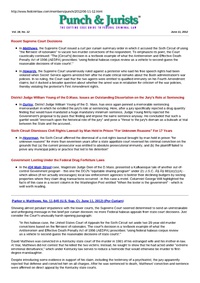Loaded on
June 11, 2012
published in Punch and Jurists
June 11, 2012
This case deals principally with one of the Federal Government’s many forfeiture statutes - 21 U.S.C. § 881(e)(1)(A) - which has become a veritable license to loot. That statute authorizes the Department of Justice (DOJ) to seize assets from both convicted criminals and people never charged with a crime, …
Loaded on
June 11, 2012
published in Punch and Jurists
June 11, 2012
In this case, Buxton Heyerman, was held in a Michigan prison for more than 17 years “for unknown reasons,” after a state appellate court reversed his criminal conviction and remanded his case back to the trial court. He was finally released in 2007 when the case was brought to …
Loaded on
June 11, 2012
published in Punch and Jurists
June 11, 2012
A civil rights lawsuit brought by a group of Occupy Wall Street protesters against the New York City Police has been allowed to proceed. The plaintiffs, who were subjected to mass arrests after they walked on a roadway to the Brooklyn Bridge during a protest on October 1, 2011, …
Loaded on
June 11, 2012
published in Punch and Jurists
June 11, 2012
Here the Court unanimously ruled against a protester who said his free speech rights had been violated when Secret Service agents arrested him after he made critical remarks about the Bush administration’s war policies; but it ducked a First Amend. Issue.
This case arose out of the arrest …
Loaded on
June 11, 2012
published in Punch and Jurists
June 11, 2012
Here the Court vacated a grant of habeas corpus by the Sixth Circuit, caustically stating its decision was based on “the flimsiest of rationales” and was a "texrbook example" of using habeas corpus to "second guess" reasonable state court decisions.
Showing almost petulant impatience with the lower courts, …
Loaded on
June 11, 2012
published in Punch and Jurists
June 11, 2012
Rodney Gurley was indicted for possession crack cocaine with intent to distribute; and, as Judge Young explained, the Government sought “to hammer” Gurley into pleading guilty “by threatening to file an information against him pursuant to 21 U.S.C. § 851” - a statute that requires the imposition of a …
